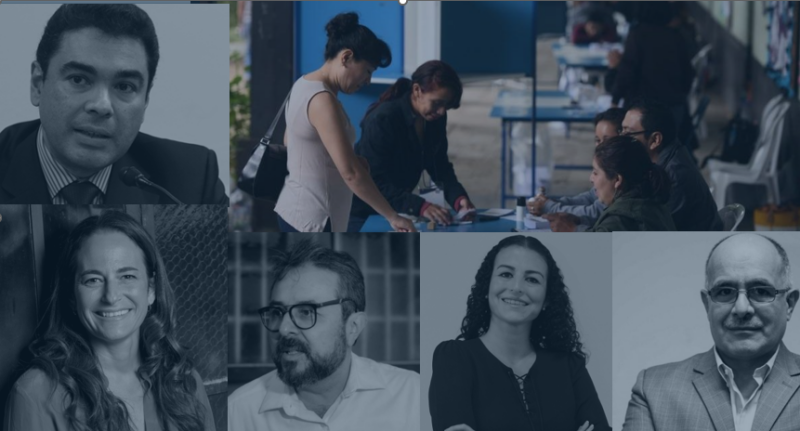Can Spain Solve the Cuba Problem?
By all accounts, Spain wants to bring change to the European Union’s Cuba policy. In so doing, it is tackling a foreign policy challenge that often sheds more heat than light.
This post is also available in: Español
As Guatemalans got ready to vote in presidential, legislative, and local elections scheduled for June 25, 2023, the Inter-American Dialogue hosted a panel discussion with Guatemalan experts on the overall context in which these elections would take place. Guatemala’s democratic institutions are fragile and subject to political interference. Leading presidential candidates from across the ideological spectrum who showed strength in the polls were disqualified on questionable grounds. The electoral campaign occurred amidst serious problems for freedom of expression and association, as well as efforts by the Attorney General’s Office to strip one candidate of immunity to criminally investigate him.
After welcoming remarks from the Migration, Remittances and Development Program director, Manuel Orozco, the panelists provided their on-the-ground view of country conditions in a conversation moderated by Tamara Taraciuk Broner, the Peter D. Bell Rule of Law Program director at the Inter-American Dialogue.
Ricardo Saenz de Tejada, Oxfam’s head of country office in Guatemala, explained that the current elections take place in the context of an authoritarian offensive by authorities. In Guatemala, there is no charismatic leader like Nayib Bukele in El Salvador, or a dictatorship such as the one in Nicaragua, but rather a coalition of political and economic illicit networks that have taken control of nearly all state institutions to benefit themselves, guarantee impunity, and perpetuate themselves in power. There’s an attempt to maintain control over the executive, legislative, and judicial branches. Key elements have been their control of high courts in the country and the attorney general’s role. This coalition has also used foreign policy to obtain legitimacy abroad, particularly with respect to the United States. Taking advantage of their control of state institutions, those in power have interfered with the electoral process, including by barring candidates who were obtaining more support in the polls and challenged the status quo from running for office.
Gustavo Berganza, sociologist, journalist, and member of the Electoral Observation Mission of Guatemala, mentioned that many young people, who could vote, were not registered to do so, which shows lack of interest in public affairs. He highlighted problems with electoral financing, including the use of illicit funds, inappropriate use of public funds, lack of proper reporting of money spent by political parties, and allegations of use of funds from drug trafficking networks in border and Pacific coast areas. The observation mission is plural, with diverse members from different ideological perspectives, which has strengthened their position as objective observers.
Marielos Monzon, journalist and columnist, described enormous challenges faced by independent journalists and media outlets. There is a strategy of harassment against independent media that intends to install in Guatemala a unique narrative of what is happening in the country that attempts to protect those in power and guarantee impunity. There is a persecution against anti-corruption prosecutors, journalists, indigenous leaders, social leaders, activists, and demonstrators that undermines the rule of law and free expression. There are media outlets aligned with the government. The independent press that challenges those in power has become the last bastion defending democracy. The harassment includes arbitrary prosecution against journalists, such as the case against José Ruben Zamora. Independent journalists are fighting for their own freedom of expression and the right of Guatemalan citizens to obtain information, which is critical to be able to exercise their right to vote.
After these initial interventions, during the Q&A section, the panelists described how journalists work collaboratively to publish critical information and combat disinformation, the risk of self-censorship, the role of the Internet and social media as sources of information in remote areas of the country, whether elections that take place in this context can provide legitimacy to the next government, how will the next president rule the country, and what to expect from Congress after the elections.
The panelists also discussed strategies to curb further democratic backsliding, including implementing a medium-term strategy beyond responding to urgencies and supporting emerging leaders and civil society, as well as recommendations for the international community to support the efforts of Guatemalans seeking to rebuild the country’s democracy. Finally, they shared reflections on what impact a new government could have on migration, the role of the European Union electoral observation mission, limited interest by youth in political issues, perspectives for the political party Semilla, examples of emerging civil society leadership, and the role of the private sector.
By all accounts, Spain wants to bring change to the European Union’s Cuba policy. In so doing, it is tackling a foreign policy challenge that often sheds more heat than light.
When Haiti was struck by a devastating earthquake, the administration of U.S. President Barack Obama quickly absorbed the depth of the tragedy and necessity of a robust U.S. response. Unless the U.S. adopts a proactive role, Haiti’s fragmented political landscape threatens to deteriorate into a political vacuum that will compound the current crisis.
Politics is swirling everywhere. Such are the ways of democracies, especially when oppositions come alive and defeat or threaten incumbents.
 Featured Photo: Sandy Pineda / publinews
Featured Photo: Sandy Pineda / publinews